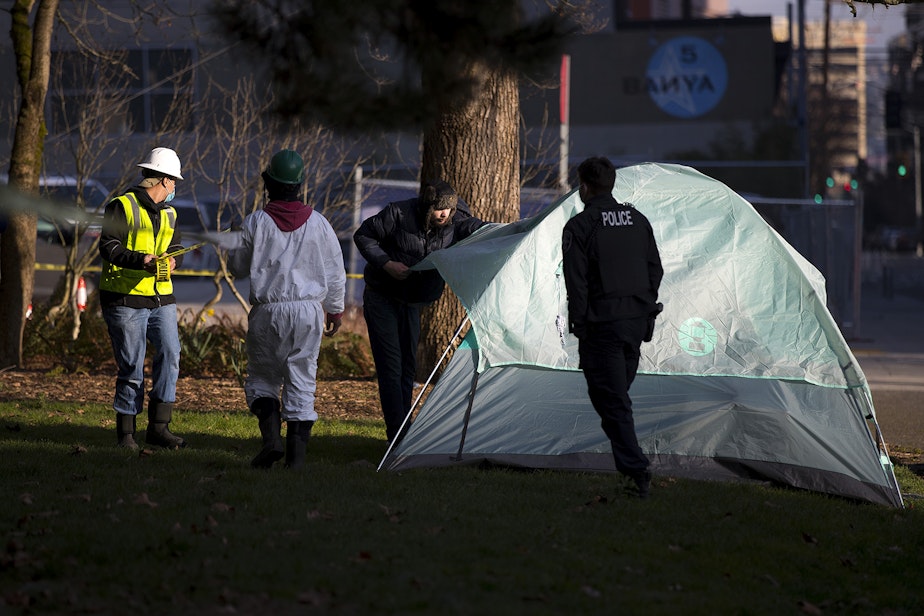People living outside struggle to get on Seattle's housing waitlist as homelessness rises

More people than ever are living outside around Seattle. A recent survey shows a 50% increase in tents since the coronavirus pandemic began.
Seattle Mayor Jenny Durkan’s office says the city is rapidly expanding shelter bed space, as community groups take on their own efforts to get people inside.
On a cold and drizzling afternoon, Shawn Murphy carried a heavy, gray tarp to his tent. His is one of the larger tents among a small group on a stretch of grass in South Lake Union, pressed right next to the constant hum of Aurora traffic.
At the camp, a friend told Murphy an outreach worker had just been there giving out info about overnight shelters. But wasn't clear what the outreach worker said.
"Nobody got a f-cking referral yet. Nobody said anything about a referral,” said Robert, Murphy’s campmate.
“Obviously he's stressed out now,” Murphy said, pulling down his wet face mask to light a cigarette. “Yeah, I'm stressing him out. My bad."
Murphy is a little frustrated Robert didn’t get more information from the person who had visited the camp. Was this their regular outreach worker, Brenda? Or was it someone new offering temporary shelters? They’ve been trying to get out of the cold and rain for years, and this was only their latest glance with one of the many outreach groups in the city.
Sponsored
The two have lived in multiple encampments around Seattle and had to move multiple times during the pandemic. Last year, they were at a motel in Renton temporarily designated for people experiencing homelessness. Most recently, they lived at Denny Park, where over a dozen people were displaced by the city. Through it all, Murphy has had ongoing contacts with different organizations.
“It’s like, here’s Brenda trying to help me again,” Murphy said. “But it's just like, Brenda, it's been six years you've known me.”
Six years — the same amount of time since the city of Seattle declared a state of emergency for people experiencing homelessness — Murphy has been in and mostly out of shelters. He’s watched as the process to get into housing has changed.
These days, he can’t just walk up to a shelter and get a bed. It's all about referrals.
"So pretty much all the places that you can go you have to have a referral,” he said. “You can't just refer yourself."
Sponsored
With the defunding of the city's Navigation Team last August, Seattle has since changed the shelter referral process.
Here’s how it works now: someone from a city contracted outreach group, maybe Brenda, would first talk to Murphy. Then Brenda might direct Murphy to the city's HOPE team, a group of eight city employees who work as a central hub receiving shelter referrals from all over the city. HOPE checks for available beds at partnering shelters, and if there's room, Murphy gets a referral — and a bed.
"You can't say, ‘Hey, I need help, I need this.’ It's weird. I don't understand it,” Murphy said.
They city says it referred 32 people like Murphy and Robert into shelters in January and 50 in February. This data is difficult to track, however, and could be incomplete. Referral numbers were also affected by cold winter storms in those months, the city says.
The city did not agree to KUOW's request for a recorded interview, but did confirm that on any given night there are not enough shelter beds for everyone who wants one. In an email, city spokesperson Will Lemke said they expect “hundreds of more people to accept shelter in the coming months as we open additional resources.” That includes dozens of new beds at two recently opened motel shelters.
Sponsored
It's estimated that over 3,000 people sleep outside every night in Seattle.
Some community groups are not waiting, however, for the city to ramp up services. Andrea Suarez runs We Heart Seattle, a group of volunteers who came together during the pandemic. They remove trash around tent encampments that have grown in city parks.
Suarez says they’ve also raised tens of thousands of dollars this year to move people out of tents “to help with things like apartment first and last month's rent.”
We Heart Seattle has been criticized online for their emphasis on trash removal over providing health services. There have been reports of the group removing tents out of parks without people's permission. The group of volunteers is not affiliated with the city and the city does not provide oversight of these efforts.
“For training: I am not clinically trained. We have people that are high impact volunteers, that have gone through drug and alcohol counseling certifications and things like that, of course,” Suarez said.
Sponsored
They have moved people into housing, like Tina Hill. Hill lived in Denny Park for a couple of months with her partner before We Heart Seattle got them into an apartment.
"We were able to get out,” Hill said looking around the now empty Denny Park, “Andrea’s helped us with furniture as well and put me in a direction to find a job. So hopefully on Thursday I'll be riding a bike doing Safety Patrol."
But for Shawn Murphy and his friend Robert, they’re not even thinking about their own apartment. They’re still waiting on that prized referral for a spot at a city shelter.
"It's like six years in and, you know, I've been very much interested in getting housing,” Murphy says.
Robert held Murphy’s cigarette while he fixed the tarp to the top of the tent with a pair of bungee cords. He said he wanted to hunker down for the night in case that person with shelter information came back.




